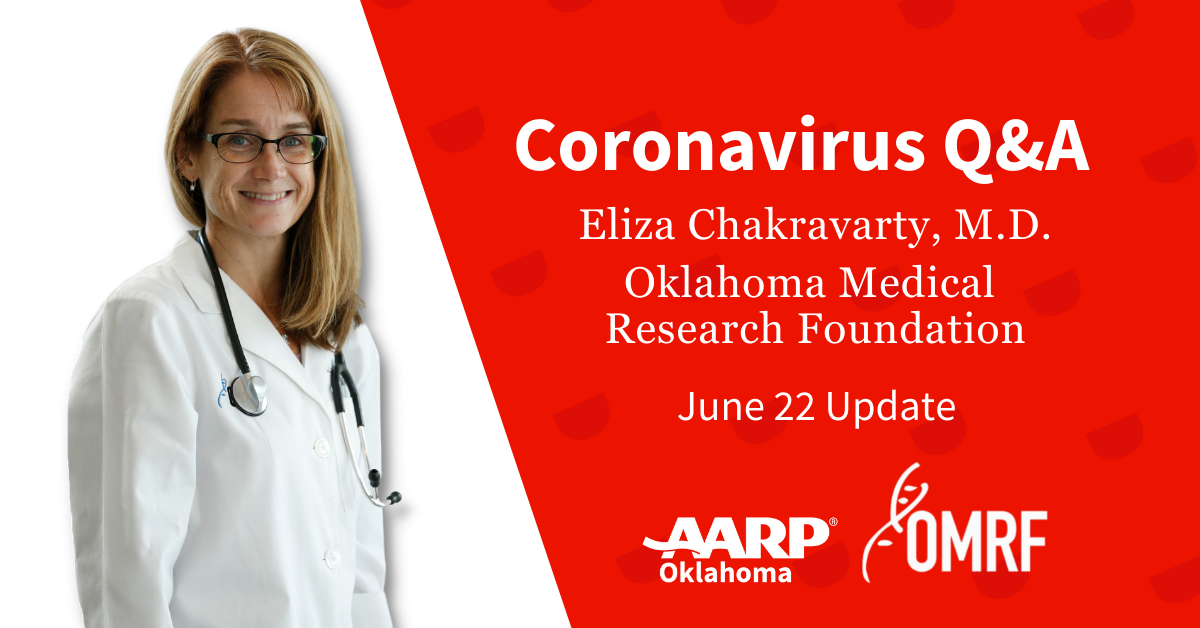Coronavirus, COVID-19 and vaccination Q&A with Dr. Eliza Chakravarty: June 22, 2021 Update

Dr. Eliza Chakravarty with the Oklahoma Medical Research Foundation answers your medical questions about coronavirus, COVID-19 and vaccinations.
Is it safe to stay in hotels?
If you are fully vaccinated, staying in a hotel is not a high-risk activity for COVID-19. At the onset of the pandemic, surface transmission was a concern. Today we know that surface transmission is, at best, an extremely rare vector for infection. Still, you might wipe down high-touch surfaces like light switches, door handles, remote controls, faucets and phones to guard against other viruses that may be lingering. In common areas like elevators, the lobby and restaurants, wear a mask if it makes you feel more comfortable.
If I currently have COVID-19, can I be vaccinated?
No. If you currently have COVID-19, you need to follow the CDC’s guidelines for isolation. You should not be around others until at least 10 days after symptoms appear, you are free of a fever without the use of medication for 24 hours and your symptoms are improving. After you are fully recovered, you may get vaccinated. It is possible, although rare, to get COVID-19 twice.
I’ve read that COVID-19 vaccine side effects are more substantial in women. Is that true and, if so, why?
CDC data shows that women report more side COVID-19 vaccine effects than men. The reason could be biological: women typically have a greater immune response to vaccines, sometimes producing twice as many antibodies as men. Another reason may be the underreporting of side effects by men. Statistically, women participate in health care more than men, so it would follow that women report vaccine side effects to a greater degree. Whatever the reason, side effects are not a bad thing. They are a good sign your vaccine is working.
My mother is in her 80s. After the first Pfizer shot, she only had a sore arm. Two days after the second shot, she was so tired and had muscle soreness so bad she could barely get out of the bed. Also, she didn’t eat for two days because she felt sick to her stomach. Are these typical symptoms after a second shot?
Unfortunately, they can be. Everyone reacts differently, and it sounds like your mother had a particularly rough go. Fatigue and soreness are among the most reported side effects of the COVID-19 vaccines. While an upset stomach is less common, it has been documented. Rest assured, this is the immune system hard at work.
I am fully vaccinated. How long will I need to continue to wear a mask?
Fully vaccinated people can stop wearing masks in most situations. Keep your mask handy for large crowds, airplanes and public transit. If you’re immunocompromised, you should continue to wear a mask in public until your doctor advises otherwise.
Can you talk about the safety and effectiveness of the vaccine approved for kids ages 12 to 15? Are there kids who should not get the vaccine?
Children 12 years and older can get Pfizer’s COVID-19 vaccine. Large clinical trials showed the vaccines to be safe and effective in the age group, with only mild side effects like those adults experience (soreness at the injection site, fatigue, headache and muscle aches being most common). A child with a known history of a severe allergic reaction to any of the vaccine’s ingredients should not receive a COVID-19 vaccine.


